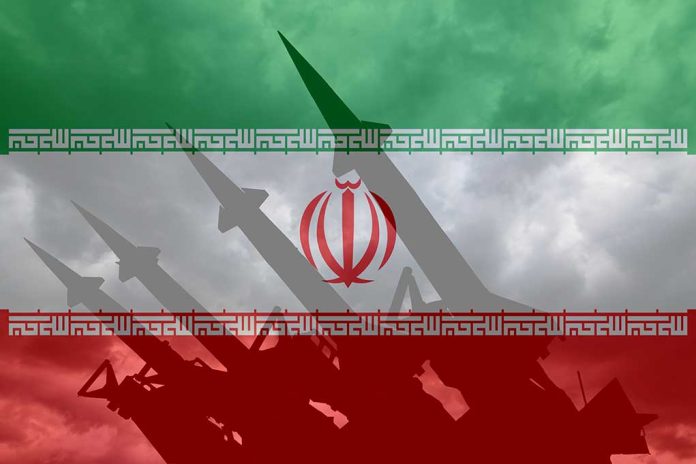🔴 Website 👉 https://u-s-news.com/
Telegram 👉 https://t.me/usnewscom_channel
Iran brokers secret talks for Russian missile transfer to Houthis, potentially escalating Red Sea tensions and threatening regional security.
At a Glance
- Iran facilitates negotiations between Russia and Houthi rebels for advanced Yakhont anti-ship missiles
- Potential transfer could significantly impact Red Sea security and threaten Western warships
- Russia’s decision pending; experts warn of ‘game-changing’ consequences for regional stability
- Move seen as part of growing Iran-Russia military cooperation amid global tensions
- US and allies express concern over possible escalation of conflicts in Yemen and beyond
Iran’s Covert Missile Diplomacy
In a startling development that threatens to destabilize an already volatile region, Iran has reportedly brokered secret negotiations between Russia and Yemen’s Houthi rebels for the transfer of advanced Yakhont anti-ship missiles. This alarming revelation, confirmed by multiple sources, underscores the growing military alliance between Iran and Russia, and their shared interest in challenging Western influence in the Middle East.
The potential transfer of these sophisticated missiles to the Iran-backed Houthis could dramatically alter the balance of power in the Red Sea, a critical maritime choke point for global trade. With their extended range and precision, Yakhont missiles would give the Houthis unprecedented capability to threaten both commercial and military vessels, including British and American warships deployed to protect shipping lanes.
Iran has brokered ongoing secret talks between Russia and Yemen’s Houthi rebels to transfer anti-ship missiles to the militant group, Reuters reported Tuesday citing three Western and regional sources.
Seven sources said that Russia has yet to decide to transfer the Yakhont… pic.twitter.com/rtsfcmypm2— Iran International English (@IranIntl_En) September 24, 2024
Escalating Tensions and Strategic Implications
The Houthis have already demonstrated their willingness to target international shipping, ostensibly in support of Palestinians in the ongoing Gaza conflict. Their attacks have disrupted maritime traffic and prompted military responses from the United States and its allies. The addition of Yakhont missiles to their arsenal would significantly enhance their ability to strike vessels throughout the Red Sea, potentially forcing a more robust Western military intervention.
“very concerning if true” – Edmund Fitton-Brown, Senior Advisor to the Counter Extremism Project and former Ambassador of the UK to Yemen
Experts warn that such a transfer would be a “game changer” for regional security. The possibility of these advanced weapons falling into the hands of a non-state actor like the Houthis is particularly alarming, as it could set a dangerous precedent and further destabilize the region. This development also raises questions about the effectiveness of international sanctions and arms control measures designed to prevent such proliferation.
Russia’s Geopolitical Gambit
While Russia has not yet made a final decision on sending the missiles, the mere fact that these discussions are taking place is deeply troubling. Some analysts suggest that Russia’s willingness to consider such a transfer may be part of a broader strategy to demonstrate U.S. weakness and influence the upcoming American presidential election. This theory aligns with past assessments of Russian interference in U.S. political processes.
“we have not observed a shift in Russia’s preferences for the presidential race from past elections, given the role the US is playing with regard to Ukraine and broader policy toward Russia” – A US intelligence official
The potential missile transfer also highlights the deepening military cooperation between Russia and Iran. Both countries, facing international sanctions and diplomatic isolation, have found common cause in challenging Western interests. This alliance of convenience threatens to reshape power dynamics in the Middle East and beyond, potentially drawing the United States into yet another protracted conflict.
Implications for U.S. and Allied Interests
The United States and its allies face a complex challenge in responding to this threat. While airstrikes against Houthi positions have been conducted, they have thus far failed to deter attacks on shipping. The introduction of Yakhont missiles would necessitate a more comprehensive strategy to protect maritime traffic and maintain regional stability.
Furthermore, this development underscores the need for a renewed focus on arms control and non-proliferation efforts. The expiration of UN restrictions on Iran’s missile exports in October 2023 has created a dangerous vacuum that adversaries are eager to exploit. Policymakers must prioritize the reinstatement of robust international measures to prevent the spread of advanced weapons to non-state actors and rogue regimes.
As tensions continue to escalate in the Red Sea and beyond, the United States and its allies must remain vigilant and prepared to defend their interests and those of their partners in the region. The potential transfer of Yakhont missiles to the Houthis serves as a stark reminder of the complex and evolving threats facing the international community in an increasingly multipolar world.
